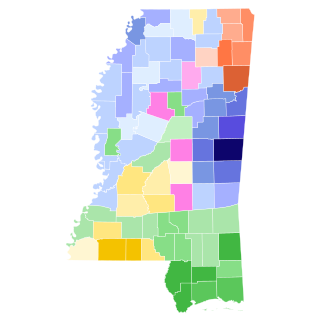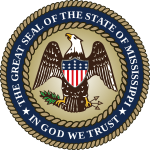
Haley Reeves Barbour is an American attorney, politician, and lobbyist who served as the 63rd governor of Mississippi from 2004 to 2012. A member of the Republican Party, he previously served as chairman of the Republican National Committee from 1993 to 1997.

John Cornelius Stennis was an American politician who served as a U.S. senator from the state of Mississippi. He was a Democrat who served in the Senate for over 41 years, becoming its most senior member for his last eight years. He retired from the Senate in 1989, and is, to date, the last Democrat to have been a U.S. senator from Mississippi. At the time of his retirement, Stennis was the last senator to have served during the presidency of Harry S. Truman.

The 1988 United States Senate elections were elections for the United States Senate. Held on November 8, 1988, the 33 seats of Class 1 were contested in regular elections. In spite of the Republican victory by George H. W. Bush in the presidential election, the Democrats gained a net of 1 seat in the Senate. 7 seats changed parties, with 4 incumbents being defeated. The Democratic majority in the Senate increased by one to 55–45.

The 1982 United States Senate elections were held on November 2, 1982. They were elections for the United States Senate following Republican gains in 1980. The 33 Senate seats of Class 1 were up for election in 1982. A total of four seats changed hands between parties, with Democrats winning seats in New Jersey and New Mexico, and Republicans taking seats in Nevada and the seat of the lone independent, Senator Harry Byrd Jr., in Virginia. Democrats made a net gain of one seat bringing them to 46 seats, while Republicans stayed at 54 seats for a majority. However, the Democratic gain in New Jersey replaced a Republican that had been appointed earlier in the year. Liberal Republicans senators in Connecticut, Rhode Island and Vermont held onto their seats, keeping the Senate in Republican hands.

The 1966 United States Senate elections were elections on November 8, 1966, for the United States Senate which occurred midway through the second term of President Lyndon B. Johnson. The 33 seats of Class 2 were contested in regular elections. Special elections were also held to fill vacancies. With divisions in the Democratic base over the Vietnam War, and with the traditional mid-term advantage of the party not holding the presidency, the Republicans took three Democratic seats, thereby breaking Democrats' 2/3rds supermajority. Despite Republican gains, the balance remained overwhelmingly in favor of the Democrats, who retained a 64–36 majority. Democrats were further reduced to 63–37, following the death of Robert F. Kennedy in June 1968.

The 1964 United States Senate elections were held on November 3. The 33 seats of Class 1 were contested in regular elections. Special elections were also held to fill vacancies. They coincided with the election of President Lyndon B. Johnson by an overwhelming majority, to a full term. His Democratic Party picked up a net two seats from the Republicans. As of 2023, this was the last time either party has had a two-thirds majority in the Senate, which allowed the Senate Democrats to override a veto, propose constitutional amendments, or convict and expel certain officials without any votes from Senate Republicans. However, internal divisions would have prevented the Democrats from having done so. The Senate election cycle coincided with Democratic gains in the House in the same year.

The Mississippi Republican Party is the Mississippi state affiliate of the United States Republican Party. The party chairman is Frank Bordeaux, and the party is based in Jackson, Mississippi. The original Republican Party of Mississippi was founded following the American Civil War, and the current incarnation of the Mississippi Republican Party was founded in 1956. The party would grow in popularity after the 1964 Civil Rights Act and is currently the dominant party in the state.
James Charles Pittman was an American politician who was a Mississippi State Senator (1980–1984) from Grenada, Mississippi. From January 2004, Pittman was a Constituent Services/Special Project Consultant on Governor Haley Barbour's staff.

The 2008 United States Senate special election in Mississippi was held on November 4, 2008. This election was held on the same day of Thad Cochran's re-election bid in the regularly scheduled Class II election. The winner of this special election served the rest of the Senate term, which ended in January 2013. Unlike most Senate elections, this was a non-partisan election in which the candidate who got a majority of the vote won, and if the first-place candidate did not get 50%, a runoff election with the top two candidates would have been held. In the election, no run-off was necessary as Republican nominee and incumbent Republican U.S. Senator Roger Wicker won election to finish the term.

The 2003 Mississippi gubernatorial election took place on November 4, 2003, to elect the governor of the U.S. state of Mississippi. Former Republican National Committee chairman Haley Barbour defeated incumbent Democrat Ronnie Musgrove by a margin of 6.78%.

The 2012 United States Senate election in Mississippi was held on November 6, 2012, alongside the 2012 U.S. presidential election, other elections to the United States Senate in other states, as well as elections to the United States House of Representatives and various state and local elections. Incumbent Republican U.S. Senator Roger Wicker won re-election to his first full term, while 92-year-old Albert N. Gore was the Democratic nominee.

The 1988 United States Senate election in Mississippi was held on November 8, 1988. Incumbent Democratic U.S. Senator John C. Stennis decided to retire instead of seeking a seventh full term. Republican Trent Lott won the open seat, becoming the first of his party to win this seat since 1874.

The 1976 United States Senate election in Mississippi was held on November 2, 1976. Incumbent Democratic U.S. Senator John C. Stennis won re-election to his sixth term.

The 2014 United States Senate election in Mississippi was held on November 4, 2014, to elect a member of the United States Senate. Incumbent Republican Senator Thad Cochran, first elected in 1978, ran for re-election to a seventh term. Primary elections were held on June 3, 2014.

The 1958 United States Senate election in Mississippi took place on November 4, 1958. Incumbent Democratic U.S. Senator John C. Stennis was re-elected to a third term in office.

The 1952 United States Senate election in Mississippi took place on November 4, 1952. Incumbent Democratic U.S. Senator John C. Stennis was re-elected to his second term in office.

The 1964 United States Senate election in Mississippi was held on November 3, 1964. Incumbent Democratic U.S. Senator John C. Stennis won re-election to his fourth term.

The 1970 United States Senate election in Mississippi was held on November 3, 1970. Incumbent Democratic U.S. Senator John C. Stennis won re-election to his fifth term, easily defeating independent candidate William Richard Thompson.

The 1947 United States Senate special election in Mississippi was held on November 4, 1947. John C. Stennis was elected to fill the seat vacated by the death of Theodore G. Bilbo.



















